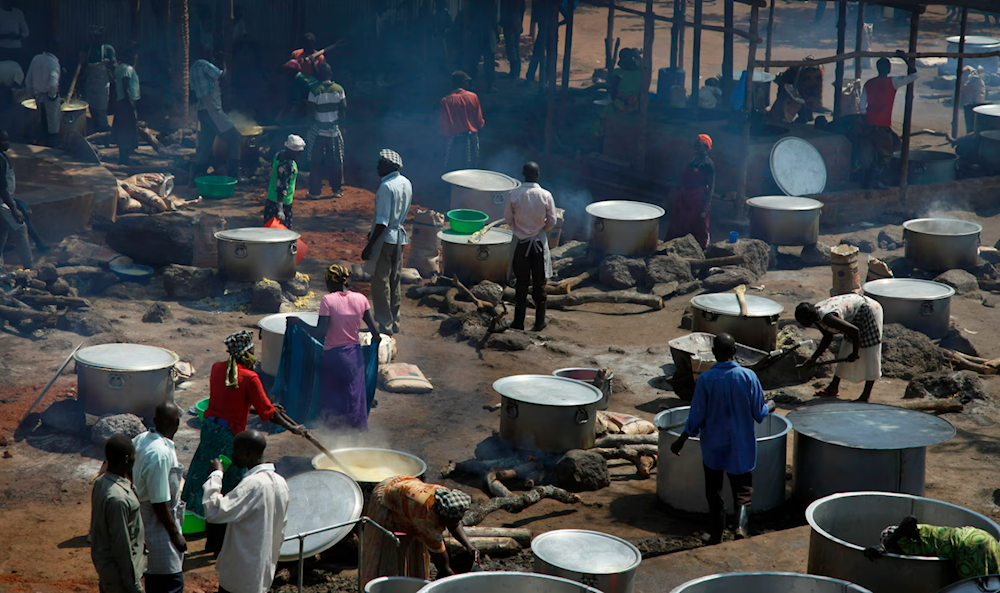Uganda: UN halts rations for 1 million refugees, Trump aid cuts blamed
Trump-era aid cuts and global inaction trigger warnings of forced repatriation and unrest.
-

People cook maize porridge, known locally as posho, donated by USAID at Uganda’s Bidi Bidi camp, one of Africa’s largest with more than 250,000 refugees. (Stephen Wandera/AP)
Food rations for a million refugees in Uganda have been entirely cut off this week as the United Nations World Food Program (WFP) faces a severe funding shortfall. The move has sparked fears that Uganda could soon begin forced repatriations of refugees fleeing conflict in neighboring countries.
The WFP said it urgently needs $50 million to continue supporting the growing number of refugees arriving from the Democratic Republic of the Congo, South Sudan, and Sudan. Uganda currently hosts the largest refugee population in Africa, 1.8 million people, with 60,000 new arrivals recorded in the last three months.
“Due to severe funding shortages, @WFP_Uganda has cut 1 million refugees entirely off from food assistance,” the agency said in a social media post. It added that malnutrition in refugee reception centers had reached critical levels, with rates surpassing 15%, and that food rations had been reduced by as much as 80% in previous months.
Aid freeze blamed for deepening humanitarian crisis
The funding collapse follows major aid cuts from the United States and the United Kingdom. In January, former US President Donald Trump froze aid spending, and the UK followed in February by slashing its contribution from 0.58% to 0.3% of gross national income. Uganda’s Minister for Refugees, Hilary Onek, said these cuts were directly responsible for the current crisis.
🚨URGENT: #Uganda hosts Africa's largest refugee population (1.8M), with 60,000 new arrivals in just 3 months. Due to severe funding shortages, @WFP_Uganda has cut 1 million refugees entirely off from food assistance. Malnutrition has reached critical levels (15 %+) in refugee… pic.twitter.com/bhPnVpNsP8
— WFP Uganda (@WFP_Uganda) May 6, 2025
“The problem is beyond and outside our control,” Onek stated. “Trump came and radically cut off funds to support refugee programmes. Other countries are also not honoring their contributions.” Only 46% of the $858 million required for Uganda’s 2024 multi-agency refugee response has been funded.
Malnutrition rates spike in refugee reception centers
The situation on the ground has become critical. In camps like Bidi Bidi, one of the largest in Africa, refugees report severe food shortages. “We are totally messed up,” said Simon Okello, a South Sudanese refugee. “How are we going to get food to eat now? People will starve and die.”
Onek warned that hunger and desperation would lead to violence and instability.
Facing an untenable situation, Uganda’s cabinet is now considering forced repatriations of refugees from countries it considers "peaceful." Onek said discussions would begin soon. “The other option is that those refugees whose countries are peaceful, we should change our policies and make sure we force them to go back to their homes and leave us alone,” he stated.
Such a move would mark a dramatic reversal in Uganda’s long-standing reputation for welcoming displaced populations. The shift shows how global donor withdrawal is straining even the most open refugee-hosting nations.
Many refugees say they now face a grim choice: stay and starve, or return to countries plagued by war and instability. “Without food now, people might be forced to go back to their home countries or engage in illegal activities to get something to eat,” said Okello.
The UNHCR has appealed for $44 million to support 55,000 new Congolese refugees and an additional 25,000 expected over the next six months. These arrivals are putting pressure on essential services, including food, health care, and sanitation.
The UN said the influx has overwhelmed limited infrastructure, slowed refugee processing, and burdened transportation systems.
Dismas Nkunda, director of Atrocities Watch Africa, said the situation is a direct result of the retreat from global humanitarian commitments. “Matters were not helped by the coming of Trump as president and his cuts in funding for the UN. My fear is that host countries such as Uganda may be forced to become radical and reverse their otherwise good policies in hosting refugees,” he warned.

 4 Min Read
4 Min Read










